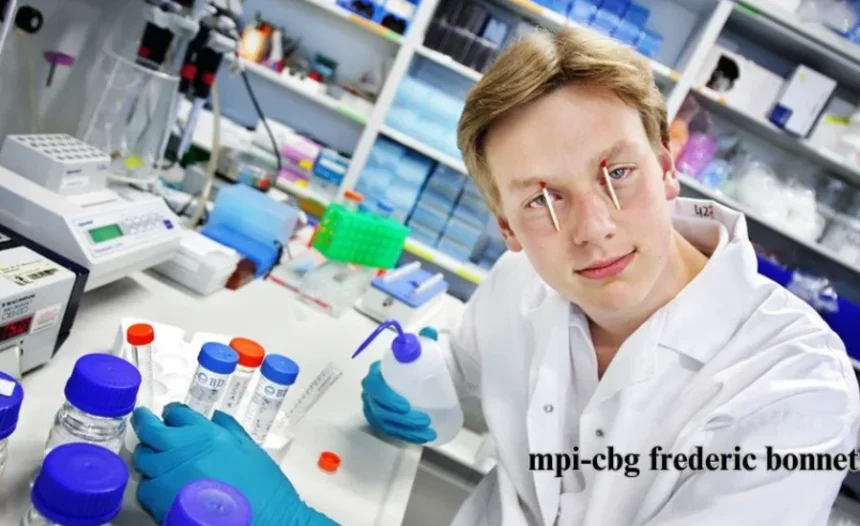Introduction to Frederic Bonnet and his work at MPI-CBG
Frederic Bonnet is making waves at the Max Planck Institute of Molecular Cell Biology and Genetics (MPI-CBG Frederic Bonnet). His groundbreaking work in cancer research is reshaping how we approach this complex disease. With a focus on interdisciplinary collaboration, Bonnet’s team unites experts across various fields to tackle cancer from multiple angles. This synergy fosters innovation that could redefine treatment options for millions.
As we delve into the powerful advances stemming from his efforts, it’s clear that the future of cancer therapy may be brighter than ever before. Join us as we explore six pivotal developments in cancer treatment and research propelled by MPI-CBG Frederic Bonnet under Bonnet’s leadership. Each advancement represents not just hope but also tangible progress toward understanding and combating one of humanity’s most challenging health crises.
Advancements in cancer treatment and research through interdisciplinary collaboration
Interdisciplinary collaboration is reshaping the landscape of cancer treatment and research. By merging insights from diverse fields, scientists are uncovering innovative approaches to tackle this complex disease.
Biologists, chemists, data analysts, and clinicians work side by side. This synergy fosters a creative environment where groundbreaking ideas can flourish. For instance, integrating artificial intelligence with molecular biology has led to quicker diagnosis and improved patient outcomes.
Moreover, sharing knowledge across disciplines accelerates the development of new therapies. Researchers can identify previously overlooked targets for drug development or refine existing treatments based on emerging data trends.
This collaborative spirit not only enhances understanding but also streamlines clinical trials. Patients benefit from more tailored options that reflect their unique genetic profiles and health conditions. Each day brings fresh possibilities as these collective efforts pave the way for revolutionary advancements in oncology care.
Targeted therapies and personalized medicine for cancer patients
Targeted therapies and personalized medicine are transforming cancer treatment. They focus on identifying specific characteristics of each patient’s tumor. This approach allows for treatments tailored to individual needs.
By studying the genetic makeup of cancers, researchers can pinpoint vulnerabilities. With this information, they develop drugs that target these weaknesses directly. As a result, patients experience fewer side effects compared to traditional chemotherapy.
Personalized medicine takes it a step further by considering not just the cancer but also the patient’s unique biology. Factors like genetics, lifestyle, and environment come into play. This comprehensive perspective ensures that every patient receives care designed specifically for them.
Innovations in diagnostic tools are essential in this field as well. Advanced imaging techniques and molecular profiling enable doctors to make informed decisions based on real-time data about the tumor’s behavior and response to therapy.
Utilizing big data and technology in cancer research
Big data is transforming cancer research in unprecedented ways. Researchers like Frederic Bonnet at MPI-CBG Frederic Bonnet harness vast amounts of information to uncover patterns that were once invisible.
Advanced algorithms analyze patient records, genomic data, and clinical outcomes. This approach leads to insights that can guide treatment plans tailored specifically for individuals. The power of technology allows scientists to sift through millions of datasets rapidly.
Moreover, machine learning models predict how different cancers will respond to various treatments. These predictive analytics enable more effective drug development processes and reduce the time it takes for new therapies to reach patients.
Collaboration across disciplines enhances this effort further. Computer scientists work hand-in-hand with biologists and clinicians, creating a dynamic environment where innovation thrives. This synergy is crucial as researchers strive toward breakthroughs that could change the landscape of cancer treatment forever.
Immunotherapy breakthroughs and their potential for curing cancer
Immunotherapy has emerged as a game-changer in the fight against cancer. By harnessing the body’s immune system, researchers are discovering new ways to target and eliminate cancer cells more effectively.
Recent breakthroughs have shown that certain immunotherapies can lead to long-lasting responses in patients. These treatments help the immune system recognize cancer cells as threats, enabling it to attack them with precision.
Innovative approaches like CAR-T cell therapy exemplify this progress. In this method, T cells are genetically modified to enhance their ability to detect and destroy tumors.
Moreover, checkpoint inhibitors have revolutionized treatment for some cancers by blocking proteins that prevent immune attacks on tumors. This strategy has provided hope for many who previously faced limited options.
As research continues at institutions like MPI-CBG Frederic Bonnet leadership, the potential of immunotherapy grows, offering new avenues toward curing various forms of cancer.
Role of epigenetics in understanding and treating cancer
Epigenetics has emerged as a pivotal player in cancer research. It examines how gene expression is regulated without altering the DNA sequence itself. This regulation can influence tumor development and progression.
Researchers like MPI-CBG Frederic Bonnet delve into these mechanisms, uncovering how environmental factors can modify epigenetic markers. These changes may empower or silence genes linked to cancerous growths.
Understanding these processes opens new avenues for treatment. By targeting specific epigenetic modifications, scientists aim to reinstate normal gene function in cancer cells. This could lead to innovative therapies that are more effective and have fewer side effects than traditional methods.
Furthermore, the field of epigenetics holds promise for personalized medicine. Tailoring treatments based on an individual’s unique epigenetic profile may enhance outcomes significantly, making strides toward more successful interventions in cancer care.
Conclusion: The future of cancer treatment and the impact of Frederic Bonnet’s work at MPI-CBG
The future of cancer treatment is promising, thanks in large part to the innovative work being done by MPI-CBG Frederic Bonnet. His focus on interdisciplinary collaboration fosters an environment where breakthroughs can flourish. As targeted therapies and personalized medicine continue to evolve, more patients are likely to benefit from treatments tailored specifically for their unique genetic makeup.
The integration of big data and advanced technology into research holds great potential for uncovering new insights into cancer mechanisms. Immunotherapy advancements add another layer of hope, potentially transforming how we view and treat this complex disease.
Moreover, understanding the role of epigenetics gives researchers a clearer picture of how genes influence cancer development and progression. This knowledge paves the way for novel therapeutic approaches that could significantly improve patient outcomes.
MPI-CBG Frederic Bonnet not only advance scientific understanding but also inspire future generations in the fight against cancer. The ongoing commitment to innovation ensures that as challenges arise, solutions will be developed with diligence and creativity, ultimately leading to a brighter future for those affected by this illness.



